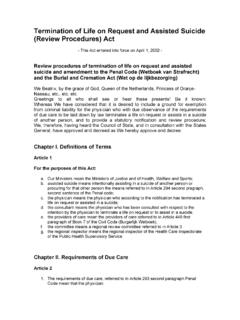Transcription of Understanding Suicidal Thinking - dbsalliance.org
1 Understanding Suicidal Thinking Suicidal thoughts are temporary. suicide is permanent. Don't give in to Suicidal thoughts . you can overcome them. If depression or bipolar disorder (also known as manic depression) affects you or someone you care about, you know that one symptom of these illnesses may be feelings of hopelessness and thoughts of suicide . If such thoughts occur, there are ways to respond with strength and courage. Many suicides can be prevented with the right kind of care, treatment, and support. Here are some facts to keep in mind: Mood disorders are not character flaws or signs of personal weak- ness, nor are they conditions that will just go away if a person thinks positive.. Mood disorders are medical conditions caused by changes in the chemistry of the body and brain. Depression and bipolar disorder may cause symptoms such as intense sadness, hopelessness, low energy, loss of appetite, changes in sleep patterns, inability to con- centrate, decreased ability to perform one's usual tasks, loss of interest in once-enjoyed activities and thoughts of death or suicide that can be difficult to ignore or overcome.
2 Depression and bipolar disorder are treatable with medication, psychotherapy, support from others and changes in lifestyle. With the right treatment, all symptoms can improve, including sui- cidal thoughts. 2. The act of suicide is often a desperate attempt to control the symptoms of a mood disorder. During a severe depression or mania, a person has little or no control over painful and dis- turbing thoughts and feelings. These are symptoms of the ill- ness, not a part of a person's true self. Some facts about treatment: There are many different medications and therapies available for successful treatment. Treatment can be effective in reducing and preventing mood disorder symptoms. Finding the right treatment may take time. Different people respond differently to medication and therapy. Medication usually takes two to four weeks to reduce symptoms and may take several more weeks to provide complete relief.
3 Some people need to try more than one medication or combination of medications before they find the one that works best. Keep this in mind as you work with your doctor to develop a treatment plan and stick with it. Never stop taking your medication without first discussing it with your doctor. Don't get discouraged if your symptoms come back. Brief re-occurring episodes of depression should not threaten your recovery if you keep in touch with your health care professional, work to find the right treatment plan, and follow that plan. 3. If You Are Feeling Suicidal The belief that there is no hope is not the truth. When you feel this way, it's your illness talking . your mind is lying to you. Remind yourself that Suicidal thoughts are not reality. If you are Thinking of suicide , it is important to recognize these thoughts for what they are: expressions of a treatable medical illness.
4 They are not true and they are not your fault. Don't let fear, shame or embarrassment stand in the way of communication with your physician, therapist, family, or friends; tell someone right away. Tell a trusted family member, friend, or other support person, someone you can talk with honestly. Try not to be alone when you feel this way. This may mean sitting quietly with a family member or friend, going to a support group or going to a hospital. Get help. Tell your health care professional. Suicidal Thinking can be treated. When Suicidal thoughts occur, they are your signal that, more than ever, you need help from a professional. Know that you can get through this. Promise yourself you will hold on for another day, hour, minute, or whatever you can manage. 4. suicide Prevention It's very helpful to have a plan of action ready before thoughts of suicide re-occur.
5 Stay in contact with your doctor. Always have your doctor's phone number with you an office number as well as a pager or after-hours number and a back-up number such as an emergency room or suicide crisis line like 1-800-784-2433 (1-800- suicide ). Stay in contact with trusted friends. Develop a list with phone numbers of dependable family members and friends who can give you support during a crisis. Keep the list with you. Make a Plan for Life (see page 16 for an example) and promise yourself that you will follow it when you start to have sui- cidal thoughts. Give a copy of your plan (including your list of phone num- bers) to family and friends before it's needed, so they can be prepared to act quickly if needed. Recognize symptoms for what they are. With your doctor, therapist (counselor) or trusted friends, identify the symptoms you are likely to experience when your illness is at its worst.
6 Always remember: feelings are not facts. Suicidal feelings are not your fault; they are a symptom of your illness. They may not seem tem- porary, but they are. As you learn to manage your illness, you will be able to spot your warning signs sooner and get help earlier. Write down your thoughts. Spend a little time each day writing down your thoughts about the things and people you appreciate and value in your life, and your hopes for the future. Read what you've written when you need to remind yourself why your own life is important. 5. Connect with other people socially. When you are feeling Suicidal , don't stay alone. Walk around a mall, or go to a library or go to a park get around people who are active and busy. Visit family and friends who are caring and Understanding , even if it's difficult. Attend support group meetings where you can meet oth- ers who understand what it's like to live with a mood disorder.
7 There is more about support groups on page 14. Avoid drugs and alcohol. Many suicides result from sudden, uncontrolled impulses. Since drugs and alcohol can make you more impulsive, it is important to avoid them. Drugs and alcohol can also make your treatment less effective. Know when it's best to go to the hospital. There may be times when your illness becomes so severe that hospitalization is the best way to protect your health and safety. Discuss this possibility and your options with your doctor before the need arises. Understand your health coverage. Know whether your insur- ance, HMO, Medicaid or Medicare plan provides psychiatric hospi- talization coverage, and how much. Keep copies of policy num- bers and important health care information in an easy-to-find place. If you don't have insurance coverage, find out what other options you have, such as community or state-run facilities.
8 Keep yourself safe. Make sure you do not have access to weapons or anything you could use to hurt yourself. Have some- one hold on to your car keys when you are feeling Suicidal . Throw away all medications you are no longer taking. Give yourself time to get better. When you are first treated, or when you have recently had a severe depressive or manic episode, give your brain and body time to heal. Allow yourself to take life a little more slowly, and don't get discouraged if you aren't up to your previous activity and lifestyle levels right away. With contin- ued treatment, you can feel better. 6. If You are Worried that Someone is Considering suicide You cannot make someone Suicidal by asking straightforward, caring questions. With courage and Understanding , you can help a friend or family member overcome thoughts of suicide . If you are prepared and informed, you will be better able to help.
9 It is extremely important for people with mood disorders to receive early, quality treatment from health care professionals. If you believe someone close to you has serious depression, help that person find and stick with effective treatment. Be supportive, reassuring and willing to talk about Suicidal feelings and thoughts. Take any mention of death or suicide seriously. If someone you know talks about suicide , asking direct questions about how, when, and where he or she intends to end his or her life may help prevent the attempt. It's natural to fear that a question about suicide may anger or offend someone you care for or even that it may put the idea of suicide into a person's mind. However, you cannot make someone Suicidal by asking straightforward, caring questions. A person considering suicide may welcome the chance to talk about these feelings. 7. Warning Signs that Someone may be Considering suicide Take any mention of death or suicide seriously.
10 Unbearable feelings: Depression causes some people to have powerful, extreme feelings of hopelessness, despair and self- doubt. The more intense these feelings become, and the more often they are described as unbearable, the more likely it is that the idea of suicide may enter the person's mind. Taking care of business, making final plans, preparing wills or life insurance or arranging for the family's welfare is another warning sign. The person may give away valued possessions or make reference to what others will do after I'm gone.. Rehearsing suicide , seriously discussing one or more specific suicide methods, purchasing weapons and collecting large quantities of medication are all signs. Even if the person's Suicidal thoughts seem to come and go, it is important to step in early and help. Drug or alcohol abuse is often a separate, treatable condition that must be addressed along with the mood disorder in order for treatment to be successful.
















